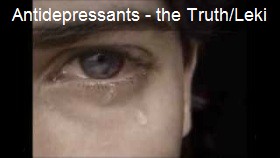
LINKS
Our blog ![]()
Neuroscience and Psi ![]()
Toxic Antidepressants
Ask a Patient about meds
drugs.com/drug_interactions
Dr. Peter Breggin
Dr. David Healy
The Icarus Project
Seroxat Sufferers by Fiddaman
www.femhc.org
Surviving Antidepressants
GoodNewsNetwork
Robert Whitaker's blog
R. Whitaker Mad in America
Mark Foster
Antidepressantsfacts.com
www.benzo.org.uk
Benzobuddies.org
Crazymeds.us
SSRI Stories
Life After Antidepressants
How do we heal?
The healing process is hardly ever linear. The patient’s condition constantly changes, and after a period of
improvement, the symptoms usually worsen again temporarily. The most adequate analogy for the recovery process
is to compare it to the solving of the Rubik's Cube. When any given symptom improves, the others may worsen temporarily.
The recurrence of the symptoms is often referred to by the patients as a “wave”. The short spells of slight lessening
of the symptoms is often described as a “window”. Unfortunately, those are usually followed by the next of the “waves”.
With the passing of time though, the “waves” become less and less intense, until the point when body reaches the state
of homeostasis again.
The paradox of antidepressants
Paradoxically, we may often emerge from the SSRIs experience in a state worse than the one we were
in before starting taking the drugs. Since most of the doctors do not even know about the existence of
the protracted withdrawal syndrome, drawing upon the knowledge they have (the knowledge, unfortunately,
very much influenced by pharmaceutical companies), they will attribute the worsening of the symptoms in the
patient to his/her original depression.
What is even worse, the physical and emotional worsening experienced by the patient may sometimes be ascribed
to an “underlying” or “dormant” condition, which “got activated” by the bout of depression.
The professionals, relying on the medical literature (which does not even mention the
protracted withdrawal syndrome), in order to treat the thus far “dormant” condition, or to simply continue to
“treat” the depression itself, will prescribe the patient ever more drugs.
Waves, windows and healing
Cyclical periods of improvement ("windows") and temporary setbacks ("waves"), with slow overall improvement,
is characteristic of neurological healing. From a psychological point of view, experiencing, first improvement,
then the sudden and unexpected worsening of the symptoms, proves an exceptional challenge for the individual.
On top of it, the symptoms experienced while in the wave fluctuate. Many people describe waves as being different
from one another, both in terms of their symptoms and their intensity.
Also, some symptoms are extremely difficult to describe, making the whole situation even more complicated.
It needs to be always remembered though, that the symptoms, and their “wave and window” character is only temporary,
and that at some point the individual starts to visibly improve.
This is a website of a peer support community on the Internet. Suggestions, opinions and advice provided by anyone
on this site should not be considered as professional services, and are no substitute for professional health care.
Please consult your own trusted health professional before making any changes to your medication, or making any other health decisions.


